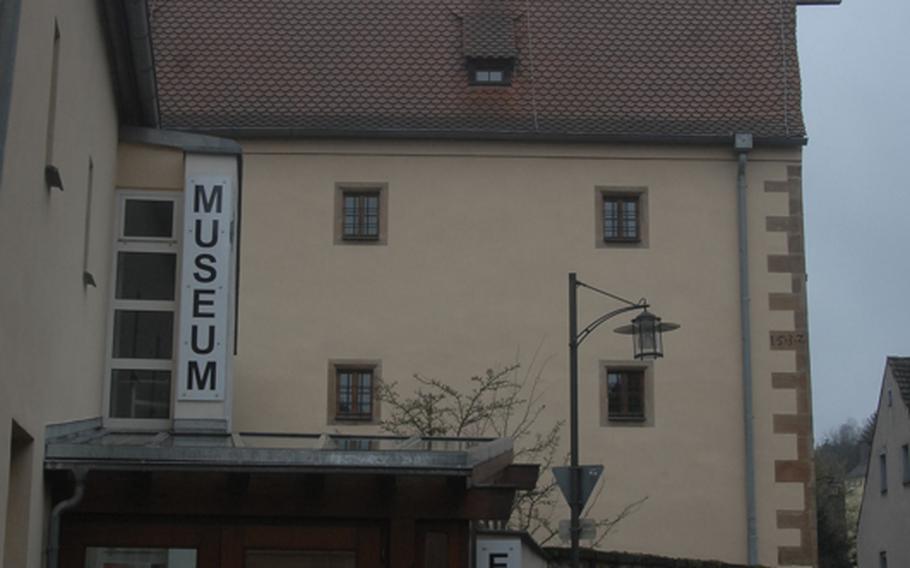
It is only a short walk from the Grafenwöhr Training Area's Gate 1 to the museum, which features exhibits about life in the region, including at its training grounds now used by U.S. troops. This year the town is celebrating its 650th anniversary. (Seth Robson/Stars and Stripes)
The Oberpfälzer Kultur- und Militärmuseum Grafenwöhr, a short walk from Grafenwöhr Training Area’s Gate 1, holds a lot of history.
Visitors to the museum (the Upper Palatinate Culture and Military Museum Grafenwöhr, in English) can trace the presence of U.S., German and Bavarian soldiers who have trained in the area for more than a century, while also learning about the history of Grafenwöhr in a building full of old furniture, clothes and other antiques as the town prepares to celebrate its 650th anniversary this year.
Military members likely will be most interested in the military display, which fills a two-story building and the bottom floor of another large warehouse. It includes hundreds of plastic aircraft models, including German World War II-era Heinkel jets, V1 and V2 rockets, Messerschmitt fighters and the Heinkel bombers from the Battle of Britain, as well as the deadly Stuka dive bombers that tormented Allied troops at Dunkirk, France.
World War I aircraft models include the Red Baron’s Fokker triplane and the British Sopwith Camel biplane, while American aircraft models include a Brewster Buffalo fighter and a Boeing P-26A fighter.
Stacked against the museum’s wall is a pile of inert bombs recovered from land surrounding Grafenwöhr.
Grafenwöhr’s main post and the town were attacked by U.S. B-17 bombers on April 5 and 8, 1945, according to Olaf Meiler, the museum’s curator. The raiders dropped an estimated 1,300 bombs ranging from 100 to 1,000 pounds as well as 90,000 incendiary bombs, Meiler said.
“They are still finding bombs around the town,” he said.
The museum has an after- action report showing that 203 B-17s from the U.S. 3rd Air Division flew in the raid.
The 1945 attack left the central part of town virtually unscathed while obliterating most of the buildings close to the post. Today, the neighborhoods near Gates 1 and 3 are composed mostly of newer buildings.
Fortunately for history buffs, many of the most distinctive buildings in Grafenwöhr survived, including the iconic water tower with its house-shaped top, the circa-1910 Tower Inn Hotel, a building once used as hospital and numerous offices.
Visitors to the museum can check out the colorful uniforms worn by Bavarian army artillerymen, the first troops to train at Grafenwöhr. There are World War I German army uniforms and weapons as well as Nazi-era uniforms, including the uniform of the dreaded SS. A photograph shows Adolf Hitler driving through the streets of Grafenwöhr, which was bedecked in Swastika banners.
The museum also tells the story of U.S. soldiers at Grafenwöhr, which started when the area was converted to a U.S. training center after World War II. It includes a display dedicated to the most famous soldier to train there, Elvis Presley. The exhibit has an old jukebox and a life-size photo of the crooner in uniform.
Meiler said it’s too early to create a display telling the story of present-day troops, whose efforts in Iraq and Afghanistan are now part of the area’s history.
robsons@estripes.osd.mil
On the QT ...Directions: From Grafenwöhr Training Area’s Gate 1, walk down Alte Amberger Strasse. Go through the intersection with Neue Amberger Strasse at the traffic light and across the bridge. The museum is on the left, at Martin-Posser-Str. 14.
Times: The museum is open Tuesday to Thursday and on Sundays, from 2-4 p.m.Costs: Admission is 3 euros for adults, 1.50 euros for ages 6 to 16, and free for younger than 6. There are also special rates for schoolchildren and groups.
Food: Grafenwöhr has plenty of places to grab a bite to eat, including small restaurants, bakeries, döner kebab joints and coffeehouses within a short walk of the museum.
Information: The museum has a German-language website, www.museum-grafenwoehr.de. For information in English, call 09641-8501 or e-mail the staff through the website.
if(typeof(dstb)!= "undefined"){ dstb();}
if(typeof(dstb)!= "undefined"){ dstb();}
if(typeof(dstb)!= "undefined"){ dstb();}
if(typeof(dstb)!= "undefined"){ dstb();}
if(typeof(dstb)!= "undefined"){ dstb();}
if(typeof(dstb)!= "undefined"){ dstb();}
if(typeof(dstb)!= "undefined"){ dstb();}
if(typeof(dstb)!= "undefined"){ dstb();}
if(typeof(dstb)!= "undefined"){ dstb();}
if(typeof(dstb)!= "undefined"){ dstb();}
if(typeof(dstb)!= "undefined"){ dstb();}
if(typeof(dstb)!= "undefined"){ dstb();}
if(typeof(dstb)!= "undefined"){ dstb();}
if(typeof(dstb)!= "undefined"){ dstb();}